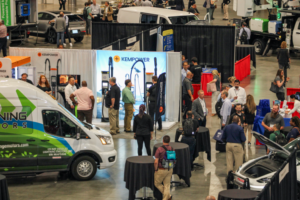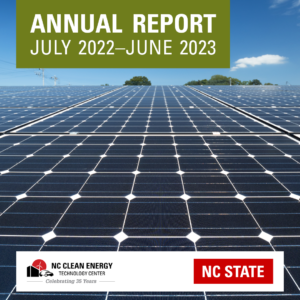NCCETC End of Year Review: Project & Program Highlights from 2023
As we bid farewell to 2023, the North Carolina Clean Energy Technology Center (NCCETC) reflects upon yet another dynamic and impactful year. Over the past twelve months, our dedicated staff collaborated with a diverse range of partners, spanning government, industry, academia and the broader community. At the heart of our mission is the unwavering commitment to promote and advance the development and utilization of clean energy.
NCCETC is steadfast in its pursuit of fostering a sustainable energy economy. Our multifaceted approach involves education, demonstration, and support for clean energy technologies, practices, and policies. Join us in this End of Year Review as we delve into the project and program highlights that have shaped NCCETC’s journey, marking the culmination of 35 years dedicated to driving positive change in the clean energy industry both in North Carolina and beyond.
Find a synopsis of program and project highlights from NCCETC’s 2023 below.
Celebrating 35 Years of the Center
 NCCETC traces its roots back to December 1987 when it was established as the North Carolina Solar Center. The Solar Center began as a partnership between the State of North Carolina, members of the North Carolina Sustainable Energy Association and the College of Engineering at North Carolina State University to promote the development of the solar energy industry.
NCCETC traces its roots back to December 1987 when it was established as the North Carolina Solar Center. The Solar Center began as a partnership between the State of North Carolina, members of the North Carolina Sustainable Energy Association and the College of Engineering at North Carolina State University to promote the development of the solar energy industry.
The Center’s 35th Anniversary was celebrated throughout 2023 with dedicated articles showcasing past and future accomplishments. First, we explored how NCCETC has partnered with and assisted students, faculty and staff at NC State University to leverage its expertise and educational programs to create new opportunities and connect the University with the energy industry across the state.
In March, we sat down with the founding Executive Director of NCCETC, Larry Shirley, to delve into the beginnings of the Center. From its inception in 1987 as the North Carolina Solar Center, NCCETC has evolved into a state agency respected for its vital contributions to North Carolina’s “clean tech” sector.
Energy Policy & Markets
Larry Shirley, reflecting on his time at the Center, highlighted the creation of the Database of State Incentives for Renewables and Efficiency (DSIRE) as a milestone achievement. NCCETC’s Policy & Markets program plays a crucial role in tracking national and local policies affecting solar, grid modernization, electric vehicles, and decarbonization, among others, through objective research, analysis, and education on energy policy issues across the United States.
This year witnessed the launch of the quarterly policy tracking report series, “The 50 States of Power Decarbonization,” providing vital updates on state and utility actions related to clean energy targets, emission reduction, and carbon policies. DSIRE’s color-coded summary maps were also updated, offering a geographical overview of policies promoting renewable energy expansion.
 NCCETC released a new Word to the Wise resource to help homeowners become a better educated consumer and navigate the financial incentives offered by electric utilities. This edition of Word to the Wise features “Your Guide to Home Energy Upgrades with the Inflation Reduction Act” and includes information about the many incentives expanded or made available via the Inflation Reduction Act. To help as many interested individuals as possible, NCCETC has also produced a version en Español: Unas Palabras para el Sabio – “Su Guía para Mejorar su Energía en la Casa con la Ley de Reducción de la Inflación.”
NCCETC released a new Word to the Wise resource to help homeowners become a better educated consumer and navigate the financial incentives offered by electric utilities. This edition of Word to the Wise features “Your Guide to Home Energy Upgrades with the Inflation Reduction Act” and includes information about the many incentives expanded or made available via the Inflation Reduction Act. To help as many interested individuals as possible, NCCETC has also produced a version en Español: Unas Palabras para el Sabio – “Su Guía para Mejorar su Energía en la Casa con la Ley de Reducción de la Inflación.”
Training & Workforce Development
Aligned with its overarching mission, NCCETC’s Training Program continues to empower individuals to embark on clean energy careers. First recognized as an Interstate Renewable Energy Council (IREC) Institute of Power Quality (ISPQ) Accredited Training Program Provider in 2004, NCCETC’s Training Program offers top-tier education in technology, policy, and business subjects.
NCCETC has dedicated itself to the education of professionals and the provision of learning opportunities for decision-makers and the general public, focusing on solar energy and other renewable energy technologies.
 NCCETC and PowerAmerica were awarded the 2023 Cleantech Innovation recognition for “Diversity in Cleantech”. As a subrecipient of PowerAmerica’s “Building Pandemic Resilience in Native American Communities” proposal, awarded by the National Institute of Standards and Technology (NIST), the NCCETC has spearheaded the effort to recruit and train participants in solar energy training courses to help meet the needs of Native American communities. NCCETC recruited participants from Tribal Colleges and Universities (TCUs) and Native American Serving Non-Tribal Institutions (NASNTIs).
NCCETC and PowerAmerica were awarded the 2023 Cleantech Innovation recognition for “Diversity in Cleantech”. As a subrecipient of PowerAmerica’s “Building Pandemic Resilience in Native American Communities” proposal, awarded by the National Institute of Standards and Technology (NIST), the NCCETC has spearheaded the effort to recruit and train participants in solar energy training courses to help meet the needs of Native American communities. NCCETC recruited participants from Tribal Colleges and Universities (TCUs) and Native American Serving Non-Tribal Institutions (NASNTIs).
Expanding on the original scope of the project, NCCETC also has been able to reach other underserved and underrepresented groups. To date, NCCETC has contacted over 750 colleges, universities, non-profit organizations, and companies, with the vast majority supporting Native American communities.
Looking forward to 2024, NCCETC’s training team announced a new course offering starting January 2024, Renewable Energy Project Development (REPD), building on the success of the Certificate in Renewable Energy Management (CREM).
Clean Power & Industrial Efficiency
While NCCETC has remained dedicated to its original mission since inception, it has expanded the scope of its activities over time to include a wider array of clean energy activities, and the individuals on the Center’s Clean Power and Industrial Efficiency (CPIE) team provide the technical expertise to support this mission. As major users of energy in North Carolina, commercial and industrial firms are essential in furthering the transformation to renewable energy sources to enable a successful transition to an economy increasingly based on renewable energy. The CPIE team provides technical assistance, planning and other services to these industrial companies to help their transition to clean and renewable energy technologies. We took a look back over the years on previous work done by the Center’s CPIE team here.
NCCETC was selected to receive a $1 million award from the U.S. Department of Energy (DOE) Solar Energy Technologies Office (SETO) to enable communities to use solar and solar-plus-storage to enhance resilience and prevent disruptions in power caused by extreme weather and other events. The project will develop a novel set of resiliency metrics and create a playbook to guide emergency managers and their communities to assess and implement enhanced energy resilience strategies to mitigate the effects of energy loss during a disaster. Development of the metrics and playbook will be accomplished through an exchange of ideas, data, and technical assistance delivery to a number of North Carolina communities interested in enhancing community resilience with renewable energy.
 The U.S. DOE’s Industrial Efficiency and Decarbonization Office announced the selection of nine organizations that will establish a network of Technical Assistance Partnerships (TAPs) to help industrial facilities and other large energy users increase the adoption of onsite energy technologies. NCCETC was selected as one of the awardees and will lead this proposed team for a DOE Southeast Onsite Energy TAP, in collaboration with team members from the University of Puerto Rico Mayagüez (UPRM) and Tennessee Tech. The award is for $1.5 million over three years, and will support technical assistance on a wide variety on technologies, including battery storage, combined heat and power (CHP), district energy, fuel cells, geothermal, industrial heat pumps, renewable fuels, solar photovoltaics, solar thermal, thermal storage, and wind power.
The U.S. DOE’s Industrial Efficiency and Decarbonization Office announced the selection of nine organizations that will establish a network of Technical Assistance Partnerships (TAPs) to help industrial facilities and other large energy users increase the adoption of onsite energy technologies. NCCETC was selected as one of the awardees and will lead this proposed team for a DOE Southeast Onsite Energy TAP, in collaboration with team members from the University of Puerto Rico Mayagüez (UPRM) and Tennessee Tech. The award is for $1.5 million over three years, and will support technical assistance on a wide variety on technologies, including battery storage, combined heat and power (CHP), district energy, fuel cells, geothermal, industrial heat pumps, renewable fuels, solar photovoltaics, solar thermal, thermal storage, and wind power.
Clean Transportation
 The Clean Transportation program at NCCETC marked 2023 with a number of successful public outreach events. The team hosts ride & drive and vehicle displays for a variety of audiences to provide an opportunity for attendees to learn more about clean transportation technologies including electric vehicles (EVs) and other alternative fuel vehicles (AFVs), along with dealers and local EV drivers onsite to answer questions about the driving experience behind the wheel of an EV. This year hundreds of attendees celebrated Earth Month through two clean transportation demonstration days, as well as several vehicle displays and ride & drive events hosted throughout April.
The Clean Transportation program at NCCETC marked 2023 with a number of successful public outreach events. The team hosts ride & drive and vehicle displays for a variety of audiences to provide an opportunity for attendees to learn more about clean transportation technologies including electric vehicles (EVs) and other alternative fuel vehicles (AFVs), along with dealers and local EV drivers onsite to answer questions about the driving experience behind the wheel of an EV. This year hundreds of attendees celebrated Earth Month through two clean transportation demonstration days, as well as several vehicle displays and ride & drive events hosted throughout April.
Earlier this year, NCCETC published a guidance document – Electric Vehicles & Electric Vehicle Supply Equipment Incentives in North Carolina – to help customers navigate the variety of direct financial incentives for electric vehicles and supporting EV infrastructure and planning offered throughout North Carolina. Incentives are available through federal, state, regional and electric utility funded programs. Staff from NCCETC’s Clean Transportation and Policy & Markets programs collaborated to develop this resource for both commercial and public sector customers interested in purchasing an electric vehicle or installing a charging station.
To help planners and developers select the perfect site to fit their needs, NCCETC developed a customizable tool for prioritizing the placement of EV chargers. The EVSE Suitability GIS product is not only able to consider several variables relevant to determining charging infrastructure siting benefits, but also has a custom weighting function so developers can tailor the weight of each variable being considered to their unique situation. The GIS product was created using data for the five counties covered by Roanoke Electric Cooperative: Bertie, Gates, Halifax, Hertford, and Northampton.
NCCETC along with Advanced Energy, Enpira, Clean Energy Works, and the Environmental Defense Fund recently concluded a powerful demonstration of a bidirectional charger and software platform from Fermata Energy. Findings from the two-year demonstration of a V2G technology in North Carolina show the positive economic potential for using bidirectional charging technologies to feed energy stored in electric vehicle batteries back to charging sites, especially when the grid is experiencing high demand.
 In August 2023, more than 400 attendees joined NCCETC in Raleigh, NC for the 2023 Sustainable Fleet Technology (SFT) Conference & Expo. During pre-conference events, the winners of the 16th annual Green Fleet Awards were announced by NAFA Fleet Management Association (NAFA).
In August 2023, more than 400 attendees joined NCCETC in Raleigh, NC for the 2023 Sustainable Fleet Technology (SFT) Conference & Expo. During pre-conference events, the winners of the 16th annual Green Fleet Awards were announced by NAFA Fleet Management Association (NAFA).
NCCETC’s Clean Transportation program rounded out 2023 with a partnership with the Upper Coastal Plains Council of Governments to promote the development of plans that enhance the resilience of electric vehicle infrastructure in the Upper Coastal Plains region of North Carolina. Part of the initiative was a webinar series designed to disseminate essential information pertaining to electric vehicle infrastructure and its resilience in the face of natural disasters. Tailored to the specifics of Eastern North Carolina, these webinars served as a valuable resource for the region and can help set the stage for similar efforts outside the region.
Thank You for a Remarkable 2023!
On April 25 and 26, over 800 clean energy professionals joined the NCCETC for the 2023 State Energy Conference of North Carolina (SEC) at the McKimmon Center on NC State University’s campus in Raleigh, North Carolina under the theme “Connecting North Carolina’s Diverse Energy Economy.” The conference featured more than 30 sessions across six different tracks, uniting professionals from state and local governments, non-profit organizations, startups, academia, and corporate entities.
 For a detailed overview of NCCETC’s major projects, operating budget statistics, and highlights from the 2022-2023 fiscal year, we encourage you to explore our most recent Annual Report. To stay updated with the latest news and developments from the Center and our programs, consider signing up for our newsletters online.
For a detailed overview of NCCETC’s major projects, operating budget statistics, and highlights from the 2022-2023 fiscal year, we encourage you to explore our most recent Annual Report. To stay updated with the latest news and developments from the Center and our programs, consider signing up for our newsletters online.
Thank you for taking a look back on a few of the project and program highlights that made 2023 a successful year at NCCETC! With enthusiasm and anticipation, we look forward to embarking on more significant and exciting endeavors in 2024. Join us as we continue to shape the future of clean energy and sustainability.